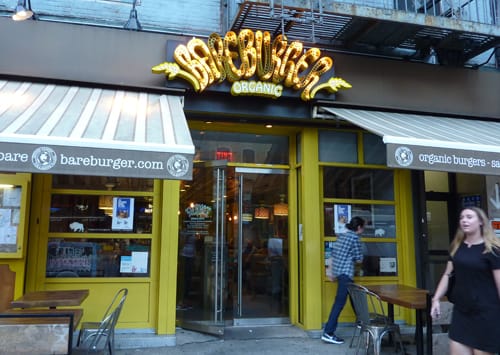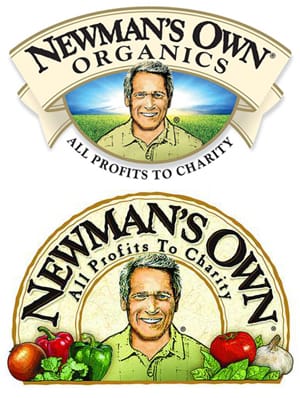USDA Will Enforce–But Consumers are the Frontline Investigators
Many consumers who choose organic food for home cooked meals want the same benefits of organic certification when they eat out. Unfortunately, many are being misled or defrauded.
Restaurants recognize that local and organic foods are no longer narrow niche markets and that promoting organic food can bring in a wider customer base, but the rules and regulations surrounding how restaurants can market their organic offerings are sparse. The federal organic regulations for retail operations generally consider restaurants exempt from organic certification.
However, it is still illegal to co-mingle or misrepresent the organic status of anything sold in a grocery store or as an ingredient used in food preparation at restaurants. The term “local,” although abused, is not a regulated term.
 |
“A problem arises when a restaurant uses the term ‘organic’ in their name, signage, or marketing materials,” said Kestrel Burcham, a policy analyst and attorney for The Cornucopia Institute. “It can and often does make consumers think the majority of what they are eating is certified organic.”
Gil Rosenberg experienced this confusion when he started eating at Bareburger, a New York City restaurant chain. Bareburger displayed that it sold organic food front and center, advertising “organic grass-fed burgers” and burgers “made with our custom proprietary organic blend,” along with other marketing on awnings, windows, and menus that flaunted the term “organic.” A burger at Bareburger will cost around $15–not cheap by American standards.
“People want organic food and they are willing to pay for it,” continued Burcham, “But what if they are not getting what is advertised? That’s misrepresentation.”
Rosenberg commented that he had been eating at various Bareburger franchise locations for nearly five years before discovering their misrepresentations. “When I would go [to Bareburger], I was told that the burgers, fries, and onion rings were ‘organic,’” stated Rosenberg. “They had the word ‘organic’ inside the restaurants, on the walls, burger clam shell boxes, takeout bags, menus, servers’ t-shirts, ketchup packs, and attached to their logo and awnings. Now it is clear to me that their marketing was designed to convince the public that all their food is certified organic, when only a small percentage of their menu is.”
The Manhattan resident and strong organic advocate continued, “Out of season, during the winter months in NYC, it is an even smaller percentage. When you see a food package on the shelf that says ‘organic,’ the understanding is that the entire contents are USDA certified organic and you look for the USDA organic seal. That is what people see when they see giant illuminated signs outside their restaurants blazoned with the words ‘Organic Bareburger.’”
“This wasn’t an accident. They premeditatedly cooked up how they used their marketing language to garner the goodwill of organic consumers without actually spending the money on organic food,” said Mark A. Kastel, Cornucopia’s executive director.
After discovering the ruse when he noticed food being delivered to the restaurant chain did not bear the organic seal, Rosenberg sent a formal complaint regarding Barebuger’s false use of the term “organic” to the USDA’s National Organic Program (NOP) in November 2017.
His evidence included photos of the storefront, signage, and menu items, witness testimony, and records of conversations with the business owner. The NOP responded to the complaint toward the end of 2018. The compliance and enforcement branch of the NOP found that the label claims used by Bareburger did not comply with the requirements of the Organic Foods Production Act. Specifically, the act prohibits any labeling that falsely implies any food product was produced or handled using organic methods in compliance with that law and the USDA’s organic regulations.
The NOP informed Bareburger of this concern and attests that the company has provided evidence of corrections underway to modify its label claims. No fine was levied in the case of Bareburger, but other complaints concerning marketing claims by retail establishments and brands have prompted more severe enforcement measures.
Cornucopia has asked the USDA to intervene in the past on other labeling abuses. Prior formal complaints by Cornucopia regarding the restaurant chain Organic Avenue and the Newman’s Own Organic brand successfully demonstrated this kind of deceptive marketing violates the organic rules and regulations.
Organic Avenue was accused of misrepresenting their juice and body cleansing products as organic and received a cease and desist letter in 2012. The NOP proposed a large fine against Organic Avenue that the restaurant chain negotiated to an $8,000 settlement.
“Despite regulators exempting restaurants, these establishments technically process organic ingredients and should be certified like the food manufacturers that create organic products. Coffeehouses that roast organic coffee beans are required to go through the organic certification inspection process. It’s not logical that a restaurant that cooks organic produce and meat does not need to carry some certification,” stated Cornucopia’s Burcham.
In 2017, organic sales in the U.S. reached a record of $49.4 billion. According to the Organic Trade Association, this number was up 6.4% from the previous year. All reports indicate the market will continue to grow as more consumers become interested in the benefits of wholesome food and authentic organic products.
“Under the USDA’s current interpretation, organic certification for restaurants is optional,” Burcham stated. “However, state and federal consumer protection law absolutely requires honesty and transparency about what is and what isn’t organic on their menus. That also means they cannot use the term ‘organic’ as a blanket marketing statement—it’s just too misleading, especially whenever businesses offer primarily conventional food with some piecemeal organic offerings.”
Many restaurants claim they serve “organic food whenever possible.” Unfortunately, this statement also represents a kind of squishy misrepresentation because buying organic options is almost always possible. The real question is, based on a pre-calculation regarding price point and profit margins: will consumers pay for it?
“We are heartened when the NOP enforces fraud laws,” said Kastel. He bemoaned the overarching problem, “The very existence of the fraudulent use of the term ‘organic’ undermines the integrity of the entire label and harms the marketplace as a whole.”
“However,” Kastel continued, “when millions of dollars are changing hands, it would have been entirely appropriate to levy a fine on the ill-gotten gains by this one chain. We need strict enforcement and penalties to act as a deterrent for other potential scofflaws in the organic industry.”
Cornucopia contends that since dedicated organic consumers are “label and menu readers,” they are the eyes and ears protecting their own food supply and ethical industry participants.
“When deceptive practices are discovered, citizens need to bring that to the attention of law enforcement officials. In the case of the integrity of organic labeling, that means the USDA organic program,” stated Burcham.
MORE:
 |
Newman’s Own Organics faced similar accusations, since the name of the brand misrepresented to consumers that all of their product line was certified organic. In response to a public clarification by the USDA, Newman’s changed their brand name and labeling to the abbreviated “Newman’s Own.”
Bareburger and other restaurants like the franchisee were capitalizing on consumer confusion by selling products that are not organic while commanding premium organic prices. This strategy is also commonly employed with other marketing buzzwords, including “local,” “all natural,” and “sustainable.” Sometimes the marketing schemes rely on omission of information, amounting to what is referred to in the industry as “greenwashing.” As New York Times food critic Laura Reiley said in a 2016 exposé: “If you eat food, you are being lied to every day.”

